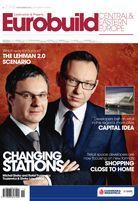This year awards are to be given in two new categories: Business Achievement of the Year and Non-Business Achievement of the Year. We Profile the first candidates and look forward to further nominations. Who will win? That's for those attending the Eurobuild Awards gala to decide
Before the crisis of 2008/9, Orco Property Group's iconic Libeskind-designed Złota 44 luxury residential sky-rise in the heart of Warsaw symbolised the dynamism, promise and optimism of Poland and its Central and Eastern European neighbours. Pretty soon, however, its empty skeletal structure, on which work ground to halt, came to epitomise the crippling effects of the credit crunch on the CEE region, despite the fact that Poland itself withstood the crisis far better than the rest of the region and in fact better than most other EU countries. This year, however, construction work on the project has restarted, gladdening the hearts of Varsovians, and Orco has high hopes. "Neither the economic turmoil, nor




























































